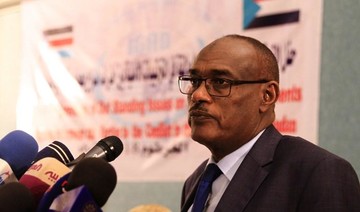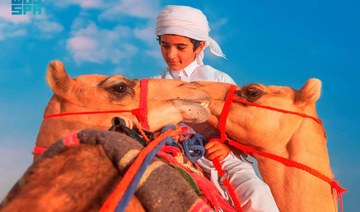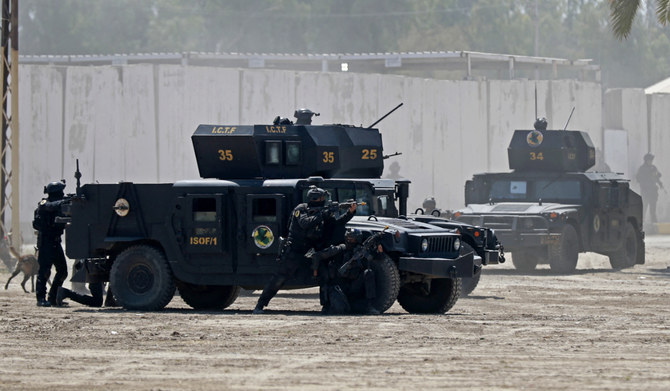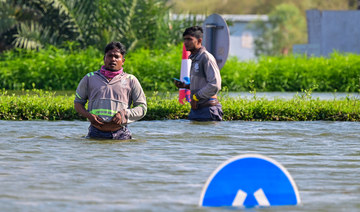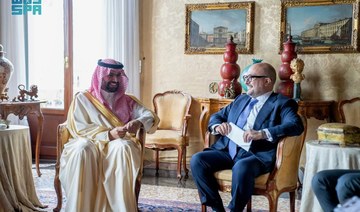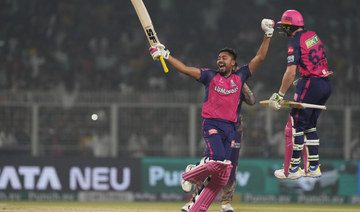JOHANNESBURG: A key broker of the latest deal to end South Sudan’s civil war diverted European weapons to South Sudan’s military despite an EU arms embargo, a new report says. It also asks how a US military jet ended up deployed in South Sudan in possible violation of arms export controls.
The London-based Conflict Armament Research report, released on Thursday, raises questions about Uganda’s support for neighboring South Sudan’s government even as it promotes itself as a neutral negotiator in one of Africa’s deadliest conflicts.
South Sudan’s warring sides signed the peace agreement in September to end a five-year civil war that has killed nearly 400,000 people. Previous deals have collapsed in gunfire. The new report is a “forensic picture of how prohibitions on arms transfers to the warring parties have failed,” said Conflict Armament Research’s executive director, James Bevan.
The report says Uganda bought arms and ammunition from at least three EU members — Bulgaria, Romania and Slovakia — that were diverted to South Sudan’s military and armed allies in Sudan. The transfers occurred before the United Nations Security Council imposed its own arms embargo on South Sudan earlier this year but well after the EU embargo.
With the Bulgarian weapons, “South Sudan arranged for Uganda to issue end-user certificates (the essential paperwork for an international arms transfer) ... to make it look like these weapons were for the use of the Ugandan armed forces when in fact they were always destined for South Sudan,” said Mike Lewis, the head of regional operations for Conflict Armament Research.
It is less clear whether Uganda’s government, a key US security ally in the region, was complicit in the diversion of ammunition shipped to it from Romania and Slovakia in 2015, Lewis said. Some of the ammunition was discovered with Sudan-based militias allied with South Sudan’s military.
Uganda’s government did not reply to evidence sent to it, Lewis said. Uganda’s military spokesman, Brig. Richard Karemire, told The Associated Press he had not seen the report. “For us, we support the peace process in South Sudan,” he said.
South Sudan’s information minister Michael Makuei Lueth rejected the findings as fake. “We don’t even have money to buy arms and now we need money for the peace agreement,” he told the AP. He added: “How can they pass an arms embargo and expect others to abide by it? If the EU has passed an arms embargo that’s up to them, but we in African countries, we’re not a member of the EU and we’re not bound by it.”
As for the exporting countries, there is no suggestion they were complicit in, or even aware of, the diversion, the new report says.
Uganda in the past has openly provided support to South Sudan’s government during the civil war, which erupted in late 2013 between supporters of President Salva Kiir and then-deputy Riek Machar. The latest peace deal once again returns Machar as Kiir’s deputy; a previous attempt at that arrangement failed amid fresh fighting in July 2016. The new deal, largely brokered by Uganda and Sudan, faces skepticism from the United States and others.
Sudan in the past quietly supplied Chinese-made ammunition to South Sudan’s armed opposition, the new report adds.
The report also describes how a network of “jointly owned Ugandan and US companies — controlled by British, Israeli, Ugandan, and US nationals — procured a military jet from the United States and an Austrian-made surveillance aircraft, which one of these companies delivered into service with (South Sudan’s military) in 2015 and 2016, respectively.”
Based on interviews and commercial documents, the report found that the company, Yamasec, transferred both aircraft to South Sudan’s military. The US military jet, after being used by Uganda’s air force, was deployed in South Sudan in 2016, overflying armed opposition targets along with attack helicopters.
The military jet’s previous private owner in the US told Conflict Armament Research that “Yamasec USA LLC took responsibility for obtaining a US Department of Commerce dual-use export license,” the report says. “The Department of Commerce, however, has stated that it issued no such license” and it is not clear whether the State Department issued a required military export license.
The Uganda-based Yamasec Ltd. used the plane to train members of Uganda’s air force, the report says. While the transfer to Uganda was not illegal, “re-export to South Sudan may have violated non-retransfer conditions under US arms export controls.”
Yamasec did not reply to Conflict Armament Research, nor to the AP.
Uganda diverted weapons to South Sudan, new report says
Uganda diverted weapons to South Sudan, new report says
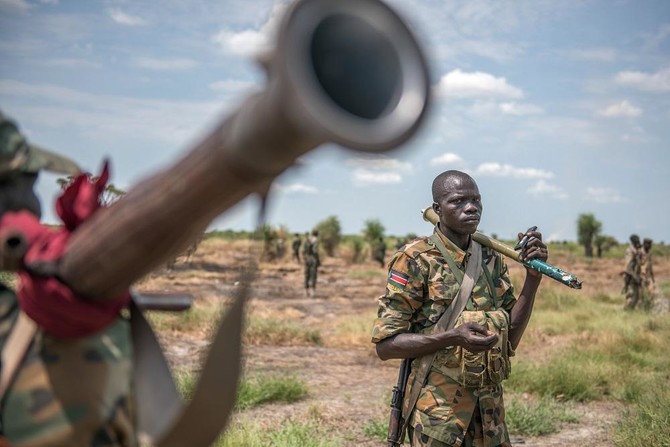
- A key broker of the latest deal to end South Sudan’s civil war diverted European weapons to South Sudan’s military
- South Sudan’s warring sides signed the peace agreement in September to end a five-year civil war that has killed nearly 400,000 people
Saudi Arabia takes part in 3rd annual international Camel Parade in Paris
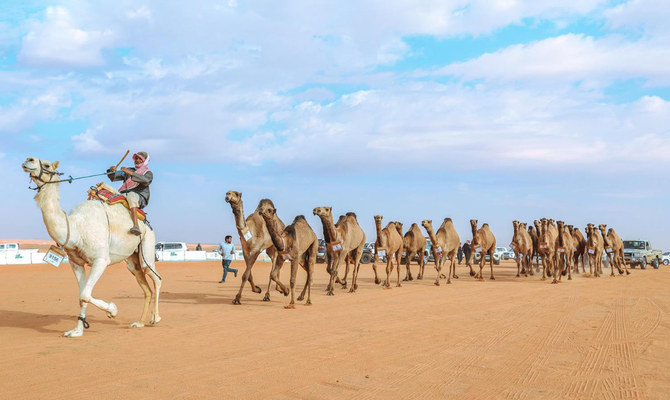
- This year’s event celebrates decision by the UN Food and Agriculture Organization to designate 2024 as International Year of Camelids
- Saudi representatives will highlight role of the Kingdom in promoting the value of camels as a cultural symbol associated with Saudi society since ancient times
RIYADH: Saudi Arabia will take part in a special Camel Parade in France on Saturday, in celebration of the UN’s decision to designate 2024 as International Year of Camelids.
The event in Paris has been organized by the French Federation for the Development of Camelids in France and Europe, under the umbrella of the International Camel Organization, and is sponsored by the Saudi Ministry of Culture and the Kingdom’s Camel Club.
This is the third year in a row in which the event has taken place. The participants in the parade of camels, llamas, alpacas and other members of the camelid family of creatures are expected to include more than 50 representatives of camel-related organizations from more than 30 countries, along with camel breeders, government officials, others with an interest in the animals, and entertainers from various branches of the performing arts.
In addition to Saudi Arabia, the countries that will be represented include the US, the UAE, Qatar, Oman, Bahrain, Canada, India, Morocco, Tanzania, Peru, Algeria, the Czech Republic, Pakistan, Tunisia, Austria, Spain, Burundi, Senegal, the Democratic Republic of the Congo, Mauritania, France, Sudan, Chad, Angola, the UK and Uganda.
Saudi representatives will highlight the role of the Kingdom in promoting the value of camels as a cultural symbol that has been associated with Saudi society since ancient times and “still enjoys great prestige,” the Saudi Press Agency reported.
On Friday, the eve of the parade, public discussions took place at the Chateau de Janvry’s historical center about cultural heritage associated with camels around the world and the specific contributions by participating countries to the annual event in Paris.
The parade will be followed by a reception for invited guests, including representatives of the participating countries, international organizations, academia, research centers and the private sector, the SPA reported.
The UN Food and Agriculture Organization named 2024 as International Year of Camelids to honor and promote the sector and highlight the important role it plays in efforts to achieve food security and economic growth in many countries.
Saudi assistant defense minister holds talks with Pakistan Army chiefs in Islamabad
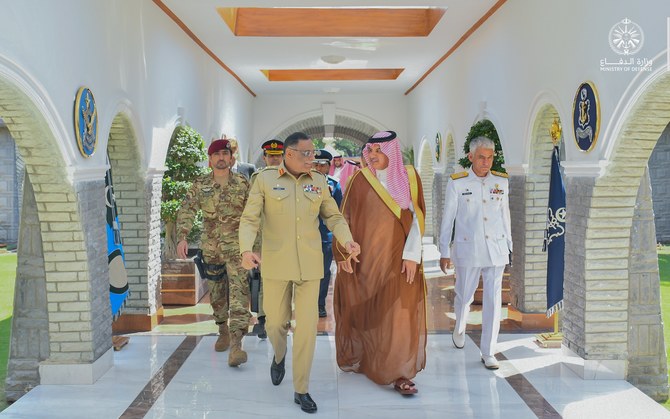
RIYADH: Saudi Arabia’s assistant minister of defense, Talal Al-Otaibi, on Friday held talks with top officials from the Pakistan Army during an official visit to Islamabad.
He reviewed relations between the two countries during meetings with the commander of the army, Gen. Syed Asim Munir, the head of the Joint Chiefs of Staff, Gen. Sahir Shamshad Mirza, and the chief of the general staff, Gen. Muhammad Avais Dastgir.
The Saudi-Pakistani Committee also met during Al-Otaibi’s visit. Its members discussed cooperation between the nations in the field of defense, including research and development, and the transfer and localization of technology, in line with the goals of Kingdom’s Vision 2030 development and diversification plan.
Saudi chair of IMFC acknowledges impact of global crises, says they should be discussed in other forums
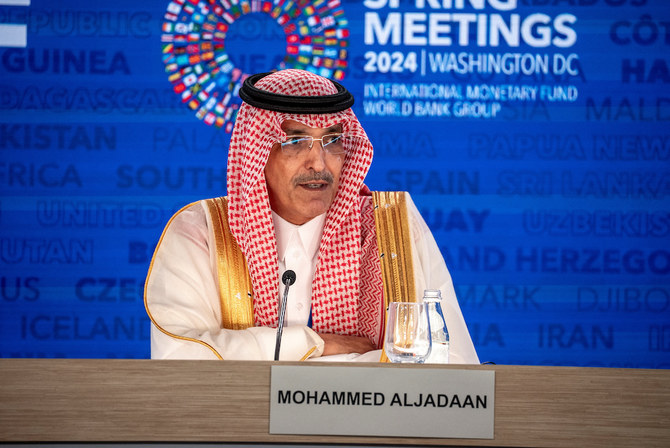
- Thanks expressed to outgoing chair Nadia Calvino for her leadership
RIYADH: The International Monetary and Financial Committee on Friday held its biannual meeting in Washington DC to discuss the global macroeconomic and financial impact of current conflicts.
The IMFC members focused on the war in Ukraine, the humanitarian crisis in Gaza, and shipping disruptions in the Red Sea, said Mohammed Al-Jadaan, the Saudi minister of finance and the body’s chair.
Al-Jadaan said IMFC members acknowledged that the crises had significant impacts on the global economy, but added that the body was not the forum to resolve geopolitical and security issues, and that they should be discussed in other forums.
He said: “The IMFC’s role is to advise and report on the supervision and management of the international monetary and financial system. This includes responses to events that may disrupt the system.
“Of course, the world and the IMF (International Monetary Fund) itself have faced multiple global disruptions over the last few years. Prospects are improving, which is very positive, but numerous challenges remain, and we need to be vigilant and ready to address them. Today’s era must not be of war and conflict.”
The Saudi minister chairs the IMFC, the policy advisory body to the IMF’s board of governors, and was speaking during the committee’s gathering at the Spring Meetings of the IMF and World Bank.
The IMFC thanked outgoing chair Nadia Calvino for her leadership and welcomed Al-Jadaan as her replacement.
Al-Jadaan said: “A soft landing for the global economy appears to be drawing closer.
“Economic activity has proved more resilient than expected in many parts of the world, though it continues to diverge across countries.”
But as ongoing conflicts continue to burden the global economy, this has led to some weak growth prospects in the medium term.
Al-Jadaan said: “Even though inflation has fallen in most regions, owing to the unwinding of supply shocks and the effects of tight monetary policy, its persistence warrants caution.
“While risks to the outlook are now broadly balanced, downside risks remain, hinging on the near-term paths for inflation and interest rates, asset prices and financial stability, fiscal policy actions, as well as geopolitical developments.”
Other pressing challenges were also affecting the global economy, such as climate change, elevated debt vulnerabilities, rising inequality, and the risk of geoeconomic fragmentation, he added.
The Saudi minister said: “Against this background, our policy priorities are to achieve price stability, strengthen fiscal sustainability, and safeguard financial stability, while promoting inclusive and sustainable growth.
“We will proceed with rebuilding fiscal buffers, carefully tailoring actions to country-specific circumstances, while protecting the most vulnerable and growth-enhancing investment.”
Al-Jadaan said central banks remained strongly committed to achieving price stability and would continue to communicate policy objectives to help limit negative spillovers.
He added: “We continue working to address data, supervisory, and regulatory gaps in the financial sector, especially nonbank financial institutions, where relevant, and stand ready to deploy macroprudential policy tools to mitigate systemic risks.”
He said the IMF stresses the importance of international cooperation to improve the resilience of the global economy and the international monetary system, adding that members will “act collectively, as appropriate, to support climate and digital transitions, including artificial intelligence, while accounting for country-specific circumstances.”
During the meeting, which was held in the presence of the IMF’s Managing Director Kristalina Georgieva, Al-Jadaan reiterated the IMF’s commitments on exchange rates, addressing excessive global imbalances, governance, and avoiding protectionist measures.
He said: “We will also continue working together to strengthen the global financial safety net, address global debt vulnerabilities (and support) vulnerable countries as they undertake reforms to tackle their vulnerabilities and address their financing needs.”
Al-Jadaan also said the IMF would continue its “critical and catalytic role in providing financial assistance to help members address their balance of payments problems and achieve economic stability and inclusive growth.”
He added that the body was looking to welcome a new 25th chair on the IMF’s Executive Board for Sub-Saharan Africa in November to improve representation and the overall balance of regional representation.
He said: “We support the IMF’s strengthened efforts to attract and develop talent to support existing and new priority areas, and to further improve staff diversity and inclusion, responding to the specific challenges identified in the FY2022-FY2023 Diversity and Inclusion Report.”
He also announced that the next IMFC 24 members’ meeting was expected to be held in October. Representatives usually meet twice a year, at the Bank-Fund Annual and Spring Meetings, to outline the proposed agenda for the IMF’s work program.
KL Rahul shines as Lucknow Super Giants beat Chennai Super Kings in IPL

- Innings played key role in pushing Lucknow past Chennai’s 176-6 with six balls to spare.
LUCKNOW: KL Rahul’s solid 82 runs off 53 balls helped Lucknow Super Giants comfortably beat Chennai Super Kings by eight wickets in the IPL on Friday.
Rahul’s time at the crease, which saw him smash nine fours and three sixes, played a key role in pushing Lucknow past Chennai’s 176-6 with six balls to spare.
“I felt that if we bat well, we could chase it down... when your partnership goes on, you can take a few more chances. Glad that it happened,” said Rahul.
Chennai got off to a slightly jittery start after being invited to bat first, losing Rachin Ravindra (zero) and skipper Ruturaj Gaikwad (17) in the first five overs. Ajinkya Rahane looked to steady the side, with the help of Ravindra Jadeja, but fell in the ninth over after racking up a respectable 36 runs off 24 balls.
Lucknow’s clinical bowling restricted Chennai in the middle overs, with Shivam Dube (three) not being able to pop off.
But Jadeja soldiered on for the rest of the game, getting his half-century in the seventeenth over.
Reliable warhorse M.S. Dhoni, who smacked 28 runs off 9 balls, helped Chennai turn up the heat in the last three overs and pushed the team to 176-6.
Lucknow openers Quinton de Kock and KL Rahul set up the chase with a superb 134-run partnership, before de Kock, who hit five fours in his 43-ball 54, fell in the fifteenth over.
Rahul went onto smash an incredible 82 runs off 53 balls before being dismissed in the eighteenth over. A final push by Nicholas Pooran (23) helped seal the victory for Lucknow.
“We lost wickets regularly and were 10-15 short,” said Gaikwad.
“Good to play them again soon, will come back with homework done.”



